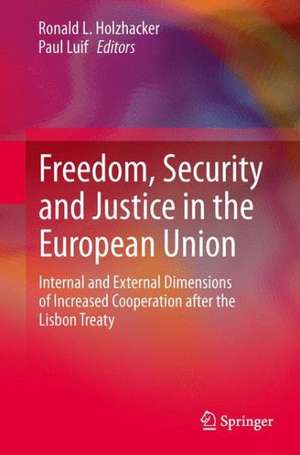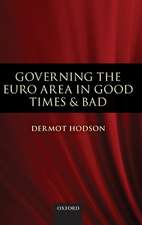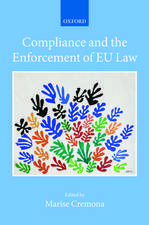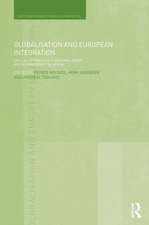Freedom, Security and Justice in the European Union: Internal and External Dimensions of Increased Cooperation after the Lisbon Treaty
Editat de Ronald L. Holzhacker, Paul Luifen Limba Engleză Hardback – 29 aug 2013
| Toate formatele și edițiile | Preț | Express |
|---|---|---|
| Paperback (1) | 380.07 lei 6-8 săpt. | |
| Springer – 23 aug 2015 | 380.07 lei 6-8 săpt. | |
| Hardback (1) | 384.86 lei 6-8 săpt. | |
| Springer – 29 aug 2013 | 384.86 lei 6-8 săpt. |
Preț: 384.86 lei
Nou
Puncte Express: 577
Preț estimativ în valută:
73.64€ • 80.24$ • 62.05£
73.64€ • 80.24$ • 62.05£
Carte tipărită la comandă
Livrare economică 23 aprilie-07 mai
Preluare comenzi: 021 569.72.76
Specificații
ISBN-13: 9781461478782
ISBN-10: 1461478782
Pagini: 200
Ilustrații: V, 146 p.
Dimensiuni: 155 x 235 x 17 mm
Greutate: 0.34 kg
Ediția:2014
Editura: Springer
Colecția Springer
Locul publicării:New York, NY, United States
ISBN-10: 1461478782
Pagini: 200
Ilustrații: V, 146 p.
Dimensiuni: 155 x 235 x 17 mm
Greutate: 0.34 kg
Ediția:2014
Editura: Springer
Colecția Springer
Locul publicării:New York, NY, United States
Public țintă
ResearchCuprins
1. Freedom, Security, and Justice: Intern- and Extern- alization in the EU and the Member States after the Lisbon Treaty.- 2. New Parliamentary Practices in Justice and Home Affairs: Some Observations.- 3. Non-Binding Peer Evaluation within an Area of Freedom, Security, and Justice.- 4. Redefining the relationship between security, data retention and human rights.- 5. The Externalization of undocumented migration controls as a threat for the EU’s constitutional commitment to fundamental human rights?.- 6. Prüm Treaty and Prüm decision.- 7. The Interface between the Area of Freedom, Security and Justice and the Common Foreign and Security Policy of the EU: Legal Constraints to Political Objectives.
Textul de pe ultima copertă
As the European Union has evolved, it has also begun to address policy questions which are closer to the very heart of the state. From cooperation in Justice and Home Affairs, originally conceived as the third pillar of European cooperation, has emerged the Area of Freedom, Security, and Justice (AFSJ). A unique aspect of policy in this area is the desire to integrate the internal and external dimensions of this policy area. One of the tensions in this policy area has been balancing the protection of fundamental rights and increasing security. The first part of this book focuses on the institutional relations of policymaking in AFSJ, both within member states and between member states, in particular the issues of national executive control, national parliamentary scrutiny and peer review across the member states with regard to AFSJ. The second part focuses on specific policy areas which are part of AFSJ. Two chapters highlight the tension found in this policy area between security and human or fundamental rights, the first related to data retention and the second on policing external borders. The final two chapters are concerned with data exchange among European countries and transatlantically with the US, and the interface between AFSJ and the Common Foreign and Security Policy (CFSP). The chapters contained in the book were presented at the Dutch Ministry of the Interior and Kingdom Relations and the Dutch national parliament (Tweede Kamer), making it of interest to scholars and practitioners alike.
Caracteristici
Focuses on the institutional relations of policymaking in AFSJ, both within member states and between member states Examines the peer review process for conduct evaluations by member states, in collaboration with the European Commission Investigates the tension between security and fundamental rights, data retention, the policing of external borders and the interface of ASFJ with the Common Foreign and Security Policy?

















